Local SEO for Water Restoration: A Guide to Attract More Clients
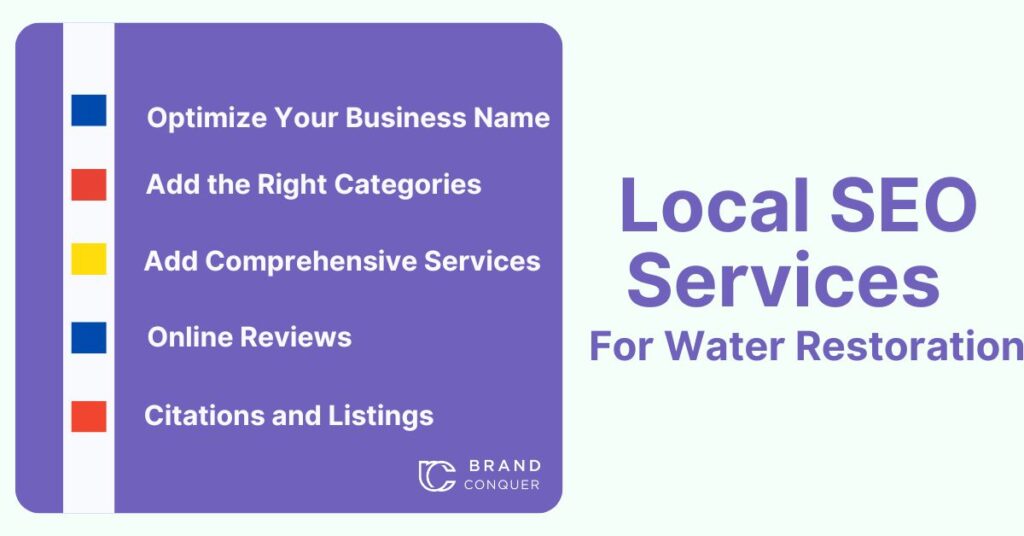
Water restoration is an essential service, especially during emergencies like flooding, burst pipes, or water damage. In such critical situations, people often turn to the internet to find local businesses they can trust. That’s where Local SEO comes in. Optimizing your online presence can help your water restoration business stand out and attract clients who need immediate assistance.
In this guide, we’ll explore how Local SEO can help you grow your water restoration business and what strategies you can implement to start seeing results of Local SEO for Water Restoration.
What is Local SEO and Why It Matters for Water Restoration Businesses
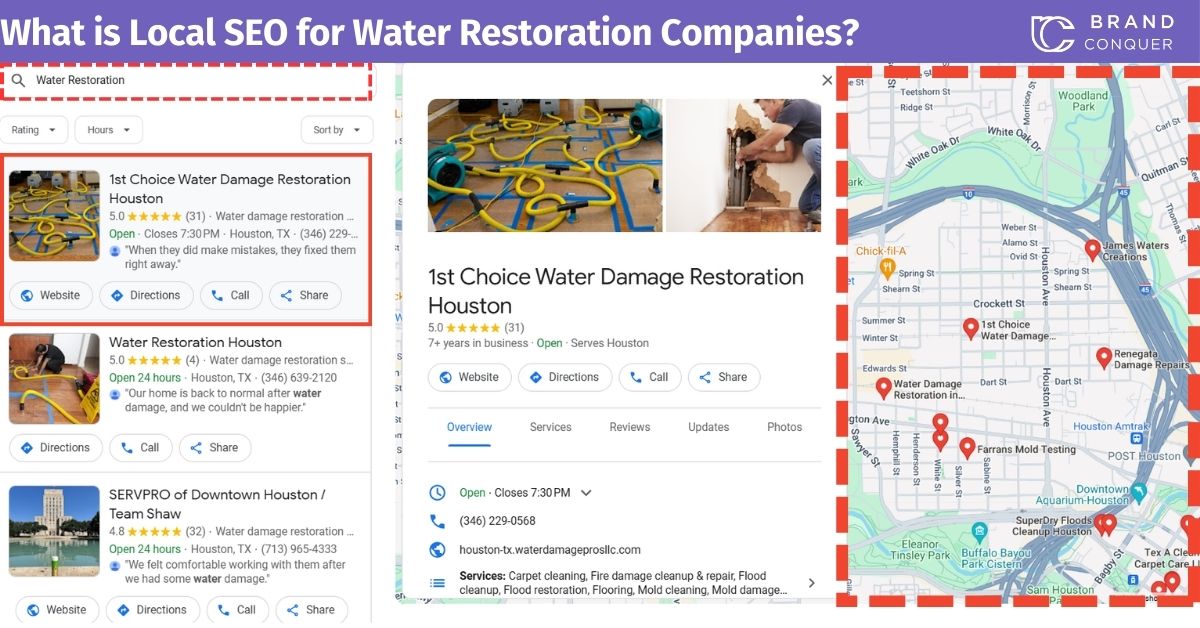
Local SEO is the process of optimizing your online presence to attract customers from a specific geographic area. Unlike general SEO, which focuses on broader audiences, Local SEO targets people searching for services “near me” or in a particular city.
For water restoration businesses, this is vital. When someone is dealing with water damage, they aren’t going to wait—they’ll search for local companies and contact the first credible option they find. Local SEO ensures your business appears in these searches, helping you capture leads and increase visibility.
Local SEO is essential because most HVAC services are inherently local. Customers often search for immediate solutions, and appearing prominently in local search results ensures your business gets noticed.
Water Restoration Company Lead Generation Chart
Lead Generation Channel | Description | Key Tactics | Lead Quality |
Google Business Profile | Free local listing optimized for emergency searches like “water damage restoration near me.” | Complete profile setup, regular updates, reviews, and adding high-quality photos. | Very High |
Google Search (SEO) | Organic traffic from ranking for water restoration keywords. | Local SEO, service-specific pages, blog content, and reviews. | High |
Pay-Per-Click (PPC) | Paid ads targeting emergency water damage restoration queries. | Google Ads, Bing Ads, and retargeting campaigns for high-intent keywords. | High |
Referrals/Word of Mouth | Leads from satisfied clients recommending your services. | Encourage reviews/testimonials and incentivize referrals with discounts or rewards. | Very High |
Social Media Advertising | Paid or organic content showcasing emergency response services. | Geo-targeted ads, before-and-after restoration videos, and customer testimonials. | Medium |
Home Service Platforms | Lead generation platforms like Angi, HomeAdvisor, or Thumbtack. | Optimized profiles, quick follow-ups, and responding to platform-generated reviews. | Medium to High |
Insurance Partnerships | Collaborations with insurance companies for restoration referrals. | Building relationships with adjusters and providing quick, reliable service. | High |
Direct Mail | Targeted mailers sent to local areas prone to water damage. | Flyers, postcards with emergency services and seasonal promotions. | Medium |
Networking and Partnerships | Partnering with plumbers, contractors, and property managers for lead sharing. | Establishing cross-promotional agreements and bundled service offerings. | High |
Cold Calling/Email | Direct outreach to homeowners and property managers. | Targeted email campaigns, follow-ups, and outreach to businesses needing restoration services. | Low to Medium |
Community Engagement | Sponsorships or local events focused on disaster preparedness. | Hosting workshops, sponsoring local events, or providing free emergency planning resources. | Medium |
Why SEO Matters for Water Restoration Companies
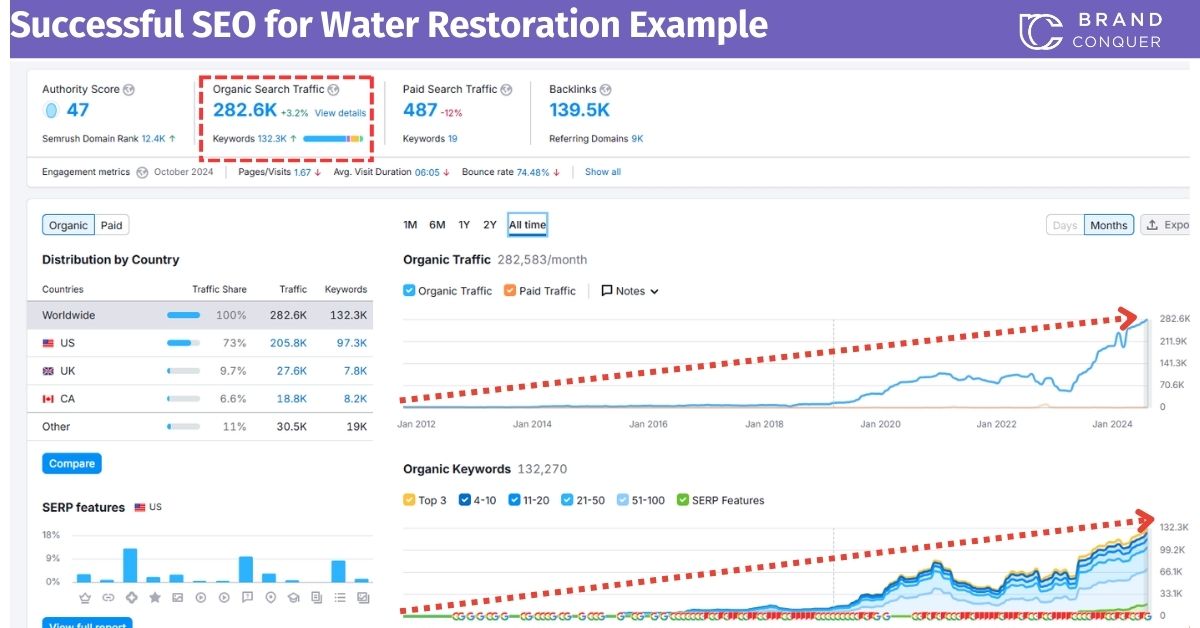
In the restoration industry, standing out among the competition is critical. SEO for restoration companies ensures that your business is visible when potential customers search for services like water damage restoration, flood damage cleanup, or emergency water repair. Since most consumers start their search for restoration services online, having a strong SEO strategy can significantly increase your chances of being discovered by people who need your services the most.
With local SEO, your business can dominate local search results, making it easy for clients near you to find you. Optimizing for water damage SEO is especially important because customers are usually looking for immediate help. If your business is visible in local search rankings, it increases the likelihood of receiving potential customers.
How Water Damage SEO Can Improve Your Local Search Rankings
Water damage SEO is a specialized approach to help damage restoration companies rank higher for keywords related to water damage, flood repair, and emergency restoration. By optimizing your website for these specific terms, your business can show up when people in your area search for water damage restoration services.
The local search aspect of SEO for water damage is essential because it targets customers who are searching for a local service provider. This means using local SEO strategies such as optimizing your Google Business Profile, targeting location-based keywords like “water damage restoration in [City]” and using location-specific content. These actions can help you rank higher in local search results, driving more relevant traffic to your website.
What Are the Key SEO Strategies for Restoration Companies?
To optimize your restoration service website for success, start by implementing key SEO strategies. First, ensure your website is mobile-friendly, as many customers will be searching for services on their phones. On-page SEO is another important tactic: optimizing meta tags, headings, and URL structure with targeted keywords is essential.
Additionally, implement technical SEO to ensure your website loads quickly and is free from errors that could affect your ranking. Use structured data and schema markup to help search engines understand your business better, particularly your services and location. By combining SEO services like these, you’ll be well on your way to boosting your website’s visibility in search engine results.
Key Elements of Local SEO for Water Restoration
Google Business Profile Optimization
Your Google Business Profile (GBP) is one of the most critical tools for Local SEO. It’s often the first thing potential customers see when searching for your services.
- Claim and Verify Your Profile: Ensure you claim your GBP and verify it.
- Complete Your Profile: Fill out all essential information, including your business name, address, phone number (NAP), service area, operating hours, and photos of your work.
- Use Keywords Strategically: Include terms like “emergency water restoration near me” or “flood damage repair in [city]” in your description.
- Post Regular Updates: Share posts about seasonal services or emergency tips to keep your profile active and engaging.
NAP Consistency Across the Web
NAP stands for Name, Address, and Phone Number, and maintaining its consistency across all online platforms is critical for Local SEO.
- Ensure your NAP details are the same on your website, social media, and directories.
- Inconsistent information can confuse potential customers and harm your Local SEO rankings.
Local Keywords for Water Restoration
Keyword research is essential for targeting the right audience.
- Focus on high-intent keywords like:
- “Flood damage cleanup in [city]”
- “Water damage restoration near me”
- “Emergency water extraction in [city]”
- Incorporate these keywords naturally into your website content, service pages, and blog posts.
Customer Reviews and Reputation Management
Positive reviews significantly impact your Local SEO and build trust with potential clients.
- Encourage Reviews: After completing a job, ask satisfied clients to leave a review on your Google profile or other platforms.
- Respond Professionally: Always reply to reviews, whether they are positive or negative, to show you value customer feedback.
Local Citations and Directories
Local citations are online mentions of your business’s NAP details. These help build credibility and boost your Local SEO rankings.
- List your business on reputable directories like Yelp, Angie’s List, and BBB.
- Search for niche directories specific to water restoration and disaster recovery services.
Geo-Targeted Website Content
Create content that resonates with your local audience.
- Service Pages: Develop pages for each city or area you serve. For example, “Water Damage Repair in Denver, CO.”
- Localized Blog Topics: Write about common water issues in your area, such as “How to Handle Basement Flooding in [City]” or “Top Causes of Water Damage in [City].”
How to Choose the Right Keywords for Water Damage Restoration
Choosing the right keywords for water damage restoration is crucial for driving qualified traffic to your website. Begin by researching target keywords that relate to water damage repair, flood cleanup, and water restoration services. Use tools like Google Keyword Planner or SEMrush to find relevant keywords with good search volume and low competition.
Incorporate these keywords naturally into your website’s content, including in the title tags, headers, and body text. Focus on long-tail keywords that have a high intent to convert, such as “emergency water damage restoration near me” or “affordable flood repair in [City]”. This helps you target potential customers who are actively looking for services in your area.
Keyword Research for Water Restoration: How to Attract the Right Clients
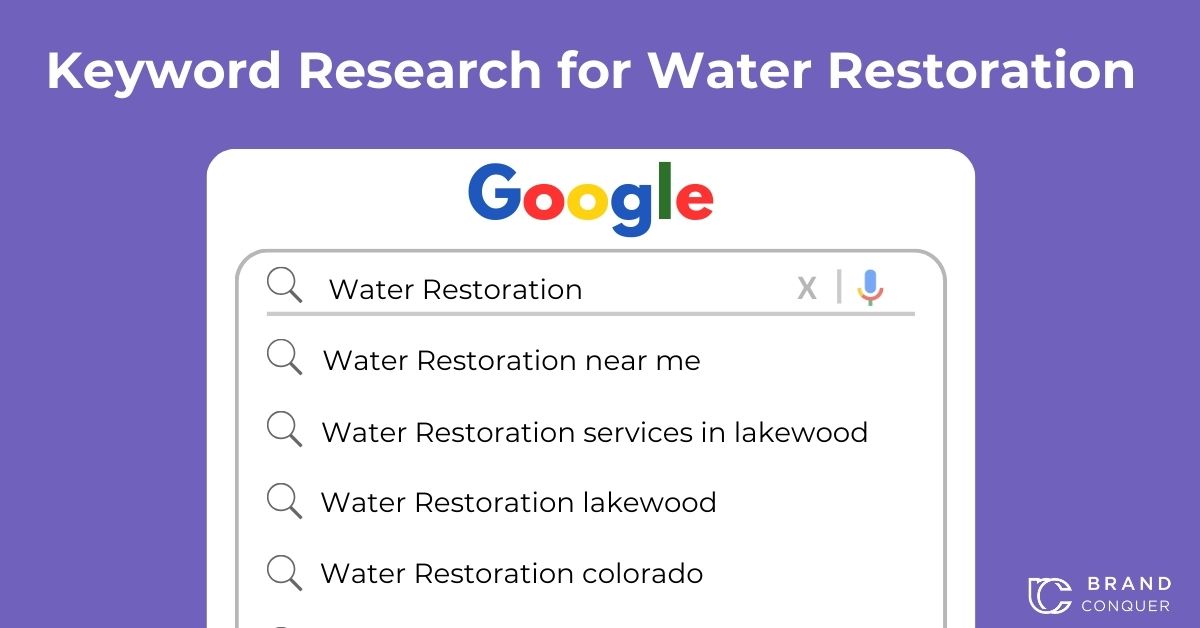
Conducting thorough keyword research is essential for optimizing your water restoration business’s online presence. By targeting the right keywords, you can attract potential clients actively seeking your services. Below is a curated list of relevant keywords, categorized by search intent and competition level:
High-Intent Keywords:
These keywords indicate a strong likelihood of conversion, as users are actively seeking immediate services.
Keyword | Average Monthly Searches | Competition Level |
Water damage restoration | 49,500 | Low |
Water restoration near me | 33,100 | Low |
Restoration companies near me | 18,100 | Medium |
Water mitigation company | 2,900 | Medium |
Water removal services | 1,600 | Medium |
Service-Specific Keywords:
Targeting specific services can help attract clients with particular needs.
Keyword | Average Monthly Searches | Competition Level |
Flood damage restoration | 8,100 | Medium |
Water extraction services | 6,600 | Medium |
Emergency water removal | 720 | Low |
Basement flood cleanup | 1,900 | Low |
Sewage cleanup service | 390 | Low |
Location-Based Keywords:
Incorporating local keywords can enhance visibility in specific geographic areas.
Keyword | Average Monthly Searches | Competition Level |
Water damage restoration [City] | Varies | Low |
Flood cleanup [City] | Varies | Medium |
Emergency water removal [City] | Varies | Low |
Water extraction [City] | Varies | Medium |
Sewage cleanup [City] | Varies | Low |
Note: Replace “[City]” with your target location.
Long-Tail Keywords:
Long-tail keywords, though lower in search volume, often lead to higher conversion rates due to their specificity.
Keyword | Average Monthly Searches | Competition Level |
How to handle water damage | 1,000 | Medium |
Best water restoration company | 720 | Medium |
Water damage repair cost | 590 | Medium |
Signs of water damage in walls | 480 | Low |
Emergency flood restoration | 320 | Low
|
Tips for Effective Keyword Implementation:
- Optimize Website Content: Incorporate these keywords naturally into your website’s service pages, blog posts, and meta descriptions.
- Local SEO: Ensure your Google Business Profile is updated with accurate information and includes location-based keywords to improve local search visibility.
- Monitor Performance: Regularly track keyword rankings and adjust your strategy based on performance metrics to stay competitive.
By strategically targeting these keywords, your water restoration business can enhance its online visibility and attract clients in need of your services.
Local SEO for Water Damage Restoration Businesses
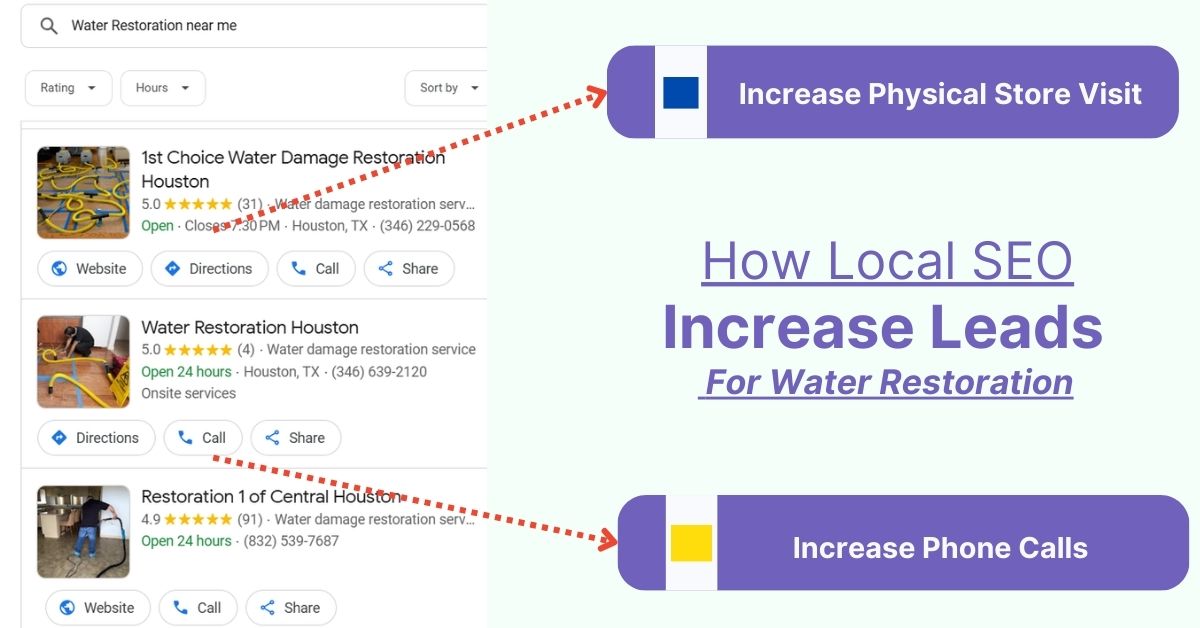
For water damage restoration companies, local SEO is crucial. To improve your local SEO, start by claiming and optimizing your Google Business Profile. Make sure your business name, address, and phone number (NAP) are consistent across all directories.
You should also focus on local citations, building backlinks from reputable local websites, and ensuring that your website contains location-based content. Local SEO for water damage restoration involves not only targeting geographic keywords but also creating content that resonates with local customers in need of restoration services.
Google Business Profile (GBP) Optimization for Water Restoration
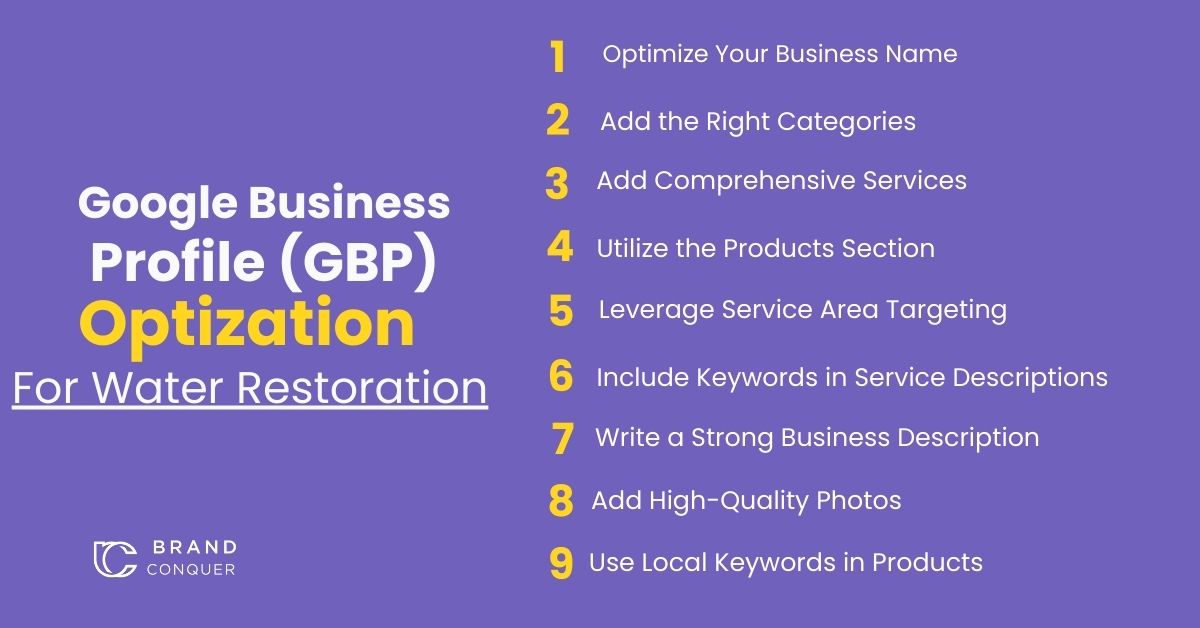
Optimizing your Google Business Profile (GBP) is crucial for increasing local visibility and attracting leads for your water restoration business. Start by ensuring your business information is complete and accurate, including your official business name, local phone number, website, and a clear address (or service area). Choose the right business categories such as “Water Damage Restoration Service” and add specific service areas to reach your target audience. Write a compelling, keyword-rich business description and regularly upload high-quality photos and videos of your work, including before-and-after shots, your team in action, and equipment used. Actively manage reviews by encouraging satisfied customers to leave positive feedback and respond promptly to both positive and negative reviews. Utilize the Q&A section to answer common customer questions, and post regular updates, promotions, and tips. Adding detailed services and prices, enabling messaging for direct customer communication, and ensuring your business hours are clear are also essential. Track insights to monitor how customers find and interact with your profile, and incorporate location-based keywords for better searchability. With an optimized GBP, your water restoration business can significantly boost local SEO, engage potential customers, and convert leads through a professional and trustworthy online presence.
Technical SEO: The Backbone of Your Water Damage Restoration Site
Technical SEO is an essential part of water damage SEO because it ensures your website performs well in search engine results. This includes optimizing site speed, fixing broken links, ensuring your website is mobile-friendly, and setting up proper redirects.
Tools like Google Search Console and SEMrush can help you identify and fix technical issues on your site. A well-optimized website will result in a better user experience, more traffic to your website, and higher rankings in search engine results.
Technical SEO Tips for Local Water Restoration Companies
Beyond content and optimization, technical SEO ensures your website performs well in search engines.
- Fast Loading Speed: Ensure your site loads quickly to avoid losing impatient visitors.
- Mobile-Friendly Design: Most local searches are performed on mobile devices, so your website must be responsive.
- Add Local Business Schema to help search engines understand your business details.
- Use service-specific schema, such as “Emergency Service” or “Water Damage Repair.”
- Embed Google Maps: Add an interactive Google Map to your contact or service area pages to make your location easily accessible.
On-Page SEO Best Practices for Restoration Service Websites
On-page SEO is critical for ensuring your website is well-optimized for both search engines and visitors. Start by ensuring your restoration business‘s website has unique, informative content that speaks to the needs of your customers. Your water damage restoration service pages should clearly outline the services you provide, how long the process takes, and why customers should choose your company.
Optimize each page’s meta tags, URL structure, and header tags with relevant keywords to improve its chances of ranking. Internal linking also plays a key role in restoration SEO, as it helps search engines understand the structure of your website and improves the user experience.
On-Page SEO Tips for Local Water Restoration Companies
Keyword Optimization
- Target Relevant Keywords: Use high-intent keywords like “water damage restoration near me” or “emergency water removal services.”
- Use Long-Tail Keywords: Incorporate phrases like “how to handle water damage in a basement.”
- Strategically Place Keywords: Add them to your title tags, meta descriptions, headings, and throughout your content naturally.
Compelling Meta Tags
- Title Tag: Use a clear, keyword-rich title. Example: “Water Damage Restoration Services | Emergency Cleanup Near You.”
- Meta Description: Write a concise, engaging summary (under 160 characters) that includes the target keyword and a call to action.
Local SEO Optimization
- Location-Specific Keywords: Include terms like “water restoration in [City]” across your site.
- NAP Consistency: Ensure your Name, Address, and Phone number are consistent across your website and local directories.
- Google Business Profile: Embed your Google Business Profile and link to it from your site.
Optimize Service Pages
- Create dedicated pages for specific services, such as:
- Water Damage Restoration
- Flood Cleanup
- Emergency Water Extraction
- Include service-specific keywords and location details.
High-Quality Content
- Write informative blog posts like:
- “5 Steps to Take After Water Damage”
- “Signs of Hidden Water Damage in Your Home”
- Use a mix of keywords, FAQs, and visuals (e.g., before-and-after restoration photos).
Internal Linking
- Link related pages together. For example:
- From “Water Damage Restoration” to “Flood Damage Cleanup.”
- Use descriptive anchor text, like “learn more about water mitigation services.”
Image Optimization
- Use high-quality images with descriptive alt text, e.g., “Before and after water damage restoration.”
- Compress images for faster loading.
Call-to-Action (CTA) Optimization
- Add CTAs like “Call Now for Emergency Water Restoration” or “Request a Free Estimate” prominently on service pages.
- Include buttons or forms for quick lead capture.
Optimize URL Structure
- Use clean, keyword-rich URLs. Example:
www.yoursite.com/water-damage-restoration instead of
Focus on Page Speed
- Minimize server response times.
- Use caching plugins and a Content Delivery Network (CDN).
- Optimize JavaScript, CSS, and images.
Create FAQ Sections
- Add FAQs addressing common customer concerns, such as:
- “How much does water restoration cost?”
- “How long does water damage restoration take?”
The Role of Content Marketing in Water Damage SEO
Content marketing is one of the most powerful tools for improving water damage SEO. By creating high-quality content related to water damage restoration services, such as blog posts, case studies, and how-to guides, you can establish your business as an authority in the restoration industry.
Your content should be informative, helpful, and optimized with the right keywords for water damage restoration. By addressing common customer concerns and providing useful solutions, you’ll increase both user engagement and your chances of ranking higher in search results.
Tracking and Measuring Local SEO Success
To ensure your Local SEO efforts are paying off, you need to track performance using tools like:
- Google Analytics: Monitor website traffic and behavior.
- Google Business Profile Insights: Review how many calls, clicks, and direction requests your profile generates.
- Rank Trackers: Keep an eye on your position in local search results for key terms.
- Call Tracking: Measure how many leads you receive from online searches.
Focus on key metrics like increased traffic, higher local rankings, and more customer inquiries.
How SEO Campaigns Can Drive More Traffic to Your Restoration Website
An effective SEO campaign can drive more traffic to your website by using a combination of on-page SEO, content marketing, and local SEO strategies. To launch a successful SEO campaign, you should begin by identifying your target audience and selecting the right keywords for water damage restoration.
Monitor your campaign’s progress using analytics tools and adjust your strategy as needed. With time and consistency, a well-executed SEO campaign can result in significant growth in traffic, leads, and conversions for your restoration service.
Why Working with SEO Experts Can Enhance Your Water Damage Restoration Business
SEO is a long-term strategy that requires continuous effort and expertise. Working with SEO experts who specialize in restoration SEO can help ensure your website is optimized effectively. An SEO professional can create a customized SEO strategy tailored to your business goals, handle the technical aspects of SEO, and track your progress to ensure you’re getting the best possible results.
By leveraging the knowledge of an experienced restoration SEO company, you can increase your website’s rankings, improve your local SEO, and ultimately drive more business to your damage restoration services.
Conclusion & Key Takeaways
- SEO for restoration companies is crucial to improve your online visibility and attract local customers.
- Implement local SEO strategies to target customers in your area searching for water damage restoration services.
- Use target keywords relevant to water damage restoration to optimize your website and drive qualified traffic.
- Focus on on-page SEO, technical SEO, and content marketing to enhance your website’s performance.
- Working with SEO experts can help you achieve long-term success and drive more business to your restoration company.
By applying these strategies, you can enhance your online presence and grow your damage restoration business with effective Local SEO for water damage.

